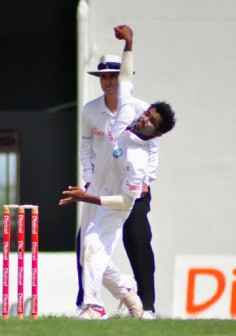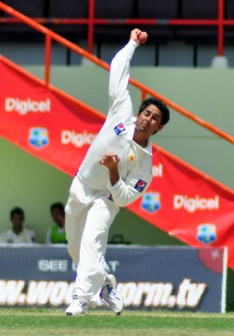Over three days of a tense, gripping, low-scoring opening Test, played out on a sub-standard surface, the West Indies have disregarded the preceding bickering and back-biting, the carping over the captaincy and the debated departures for the Indian Premier League (IPL), the politicking and the talk of Dudus and Dons, to diligently battle their way into a strong position.
A lot more hard work lies ahead this morning if they are to convert their advantage into the rare victory the game in these parts so badly needs for a host of obvious reasons.
The evidence, based on their own efforts and on the behaviour of a dry, unpredictable pitch, encourages optimism. Pakistan, 80 for three at close in quest of a winning goal of 219, will have to play extremely well or, conversely, the West Indies to lose the focus they have held throughout to defy confident expectations.
 When Ravi Rampaul, in the finest, and fittest, form of his career and Kemar Roach despatched the first three Pakistan second innings wickets for two runs, there was even the prospect of a three day win. It wasn’t never going to be that easy.
When Ravi Rampaul, in the finest, and fittest, form of his career and Kemar Roach despatched the first three Pakistan second innings wickets for two runs, there was even the prospect of a three day win. It wasn’t never going to be that easy.
A missed chance low at third slip, by Darren Bravo off the rampant Rampaul, allowed Asad Shafiq to escape before he had scored and remain defiant to the end with his calm, composed captain Misbah-ul-Haq. They had added 78 by stumps and will test the home team’s resilience to the hilt on resumption.
 Yet the statistics favour the West Indies’ first Test victory since Jerome Taylor blasted out England for 46 at Sabina Park two years ago.
Yet the statistics favour the West Indies’ first Test victory since Jerome Taylor blasted out England for 46 at Sabina Park two years ago.
Dry as board, the pitch has behaved so unpredictably that the balance has been weighted far too heavily in the bowlers’ favour for what is still considered the premier form of the game.
The three days have yielded 33 wickets for 628 runs at a scoring rate of under two and a half runs an over. Not a single batsman has passed 50 and proceedings will be done and dusted today with as much as a day and a half to spare.

Such figures are common place in the regional game yet pitch preparation is apparently very low on the priorities of the West Indies Cricket Board (WICB). It surely it is time it pays more attention to this aspect of their responsibility.
It was no wonder the smile on Saeed Ajmal’s face was as wide as the sub-continent, the twinkle in his eyes as bright as the Georgetwon sunshine as he led his team off the field yesterday with five wickets against his name for the second time in the match.
He has presented his off-breaks and doosras in a language as incomprehensible to the West Indies batsmen as Urdu, exposing shaky techniques mostly developed on unsatisfactory pitches.
More to the point, Ajmal was frank enough to admit that he was as much astonished as delighted to be provided with conditions in a foreign Test even more accommodating to spin than those renowned for this purpose in his native land.
It beggars belief that teams from the sub-continent, so pregnant with powerful spin, repeatedly come to the Caribbean to be so favoured.
When lowly Bangladesh overcame the weakened, strike-hit West Indies team in both Tests two years ago, the squares at Arnos Vale in St.Vincent and the National Stadium in Grenada could have been transplanted from Dhaka and Chittagong.
They used four spinners – Shakib al-Hasan and Enamul Haque (left-arm), Mahmadullah (off) and Mohammed Ashraful (all sorts) – who shared 33 of the 40 wickets.
Here, Ajmal and fellow off-spinner Mohammed Hafeez and left-arm spinner Abdur Rehman have snared 17 of the 20 West Indies wickets. Harbhajan Singh and a couple of Indians are next on the list in a month’s time.
From the time Hafeez was handed the new ball at the start of the uneven contest and turned it past the probing bats of openers Lendl Simmons and Devon Smith, with three fielders breathing down their necks, it was obvious that batting would be a hazardous business.
Throughout, the ball has turned sharply whenever bowlers so dictated. One would skid along ankle height, another land in the same spot on the surface and climb towards the chest and above. It was a nightmare for the wicket-keepers as much as it was for the batsmen.
Ajmal and his Pakistani colleagues were not alone in their pleasure.
Davendra Bishoo, the little leg-spinner who, in less than a couple of months, has so effortlessly mastered the demands of international cricket, exploited the conditions just as effectively in the first innings against batsmen short of Test experience, if not class.
Like all who practice his difficult art, his temperament is a vital factor in his makeup. He further established his with defiant, level-headed No.11 runs in both innings that were as critical to the balance of the match as his wickets.
His partner in yesterday’s critical last wicket stand of 48 was the redoubtable Shivnarine Chanderpaul, for the umpteenth time in his 17 years in Test cricket, keeping his head and his wicket in tact to hold off a familiar implosion.
In restricting Pakistan’s first innings to 160, gaining a lead of 66 worth double in such circumstances, Bishoo was capably supported by Rampaul’s controlled aggression that was again evident in his two immediate wickets yesterday and the nagging medium-pace of the much derided captain Darren Sammy.
Only Kemar Roach, for the first time since his accession as the spearhead of the attack, was below his best.
Rampaul, a spasmodic Test selection during his seven years in West Indies colours, has never bowled better than he has since his 5-51 against India in the first of only two appearances in the World Cup. Nor has he looked trimmer.
Then and in the three ODIs leading into the Test, his increased pace, his direction and his movement compelled his return to Test cricket. His role in determining the outcome today is likely to be as significant as Bishoo’s.
Given the composition of the eleven, it has been a gallant bowling effort. In hindsight, but only in hindsight, the attack could have done with an off-spinner.
It is ironic that, while Ajmal and Hafeez surely repeatedly exceed the 15 degrees elbow flex in delivery permitted by the International Cricket Council (ICC) – and more so Ajmal’s doosra –the bowler Clyde Butts and his panel might have turned to was Shane Shillingford, suspended for the same breach since the series in Sri Lanka last November.
The reality is that he is not around at present. Without him, a four-man bowling staff has given the West Indies their best chance of victory for some time. It is now up to them to finish the job.









